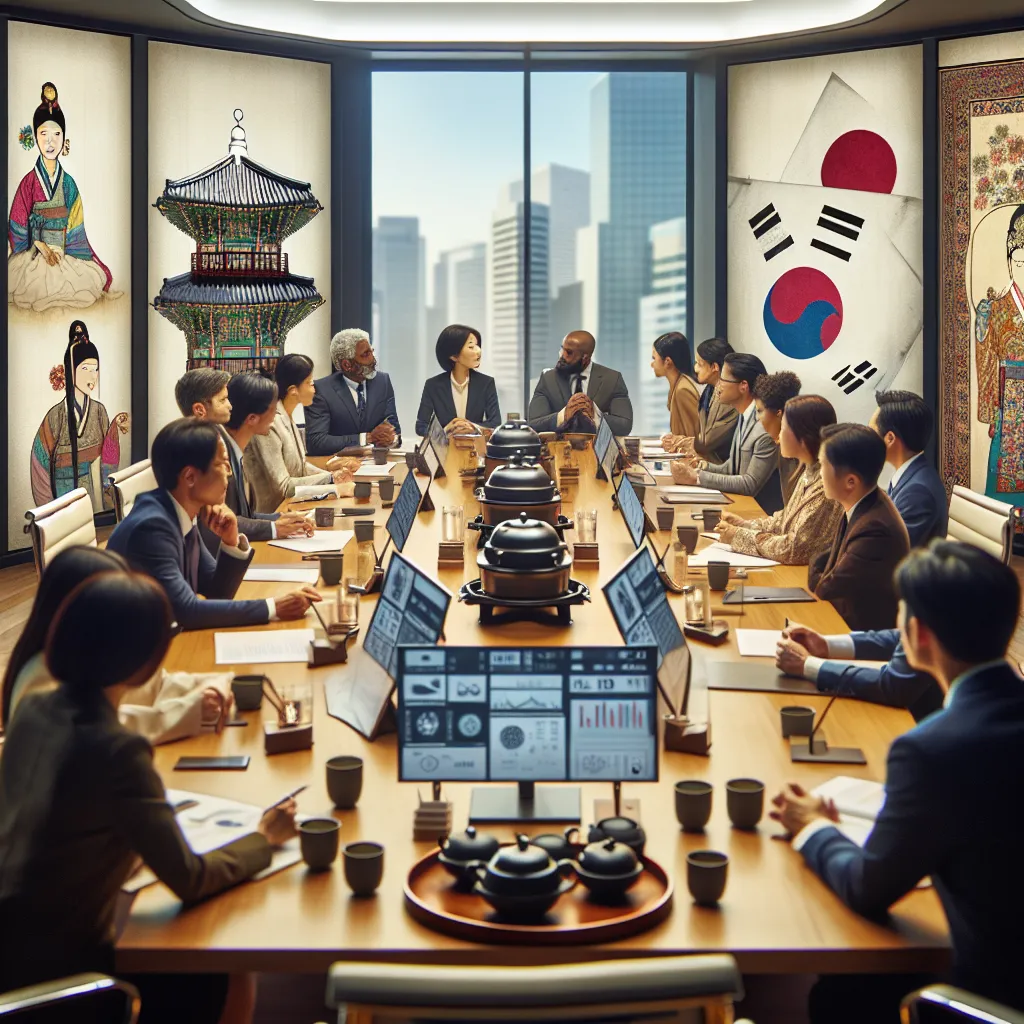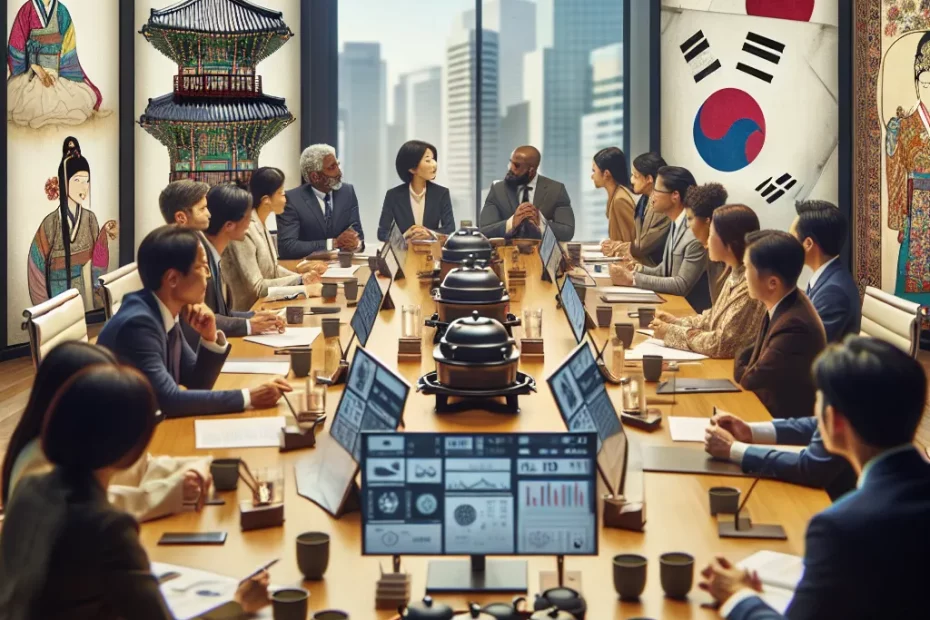In the fast-paced world of global business, effective communication is key to successful negotiations with Korean suppliers. Understanding cultural differences, building trust, and utilizing the right communication techniques are essential for achieving mutually beneficial agreements. As we delve into the nuances of business communication with Korean partners, we will explore various strategies to enhance your negotiation skills and foster strong relationships. Let’s embark on this journey together and discover the art of effective communication in the business world.

Understanding Cultural Differences in Business Communication
In the realm of business negotiations with Korean suppliers, understanding and navigating cultural differences is paramount for successful outcomes. Korea’s high-context communication style, emphasis on hierarchy, and value of relationships all play a significant role in business interactions. It is crucial to approach negotiations with sensitivity and awareness of these cultural nuances to build trust and rapport with Korean counterparts.
High-context Communication
Korean business communication is often high-context, meaning that much of the message is conveyed through non-verbal cues, context, and underlying meanings rather than explicit words. This can sometimes lead to indirect communication or subtle hints that may be missed by those from low-context communication cultures.
Hierarchy and Respect
Korean business culture places a strong emphasis on hierarchy and respect for authority. It is important to address Korean suppliers using appropriate titles and show deference to senior members of the team. Failure to do so can be perceived as disrespectful and may hinder the negotiation process.
Building Relationships
Establishing and nurturing relationships is key in Korean business culture. Taking the time to get to know your Korean counterparts on a personal level, sharing meals, and engaging in small talk can go a long way in building trust and rapport. This relational approach lays the foundation for successful business negotiations.
Patience and Perseverance
Negotiations with Korean suppliers may take longer than expected due to the emphasis on building consensus and maintaining harmony. It is essential to demonstrate patience, flexibility, and perseverance throughout the negotiation process. Rushing or pressuring for quick decisions can be counterproductive.
By recognizing and adapting to these cultural differences in business communication, you can enhance your effectiveness in negotiations with Korean suppliers. Embracing cultural sensitivity and adopting a collaborative approach will not only lead to successful business deals but also foster long-lasting partnerships based on mutual respect and understanding. 🤝
Building Trust and Rapport with Korean Suppliers
In the world of business negotiations, building trust and rapport with Korean suppliers is crucial for successful partnerships. Establishing a strong relationship based on mutual respect and understanding can pave the way for smooth transactions and long-term collaborations.
Respect for Culture and Customs
When engaging with Korean suppliers, it is essential to show respect for their culture and customs. Koreans value hierarchy and formality, so addressing your counterparts with appropriate titles and using polite language can go a long way in building a positive impression. Remember, a little courtesy goes a long way in Korean business culture!
Personal Connection
Additionally, taking the time to get to know your Korean suppliers on a personal level can greatly enhance your business relationships. Showing genuine interest in their culture, traditions, and even sharing a meal together can help break the ice and foster a sense of camaraderie. Building a personal connection beyond just business matters can create a strong foundation of trust and understanding.
Communication Style
In Korean business culture, communication style also plays a significant role in building trust. Koreans value indirect communication and often rely on non-verbal cues to convey messages. Paying attention to subtle signals such as body language, tone of voice, and facial expressions can help you better understand your Korean counterparts and strengthen your relationship with them.
Reliability and Consistency
Moreover, demonstrating reliability and consistency in your business dealings is key to earning the trust of Korean suppliers. Meeting deadlines, honoring agreements, and delivering on promises are all essential components of building a trustworthy reputation in the eyes of your Korean partners. By consistently demonstrating your commitment to your word, you can establish yourself as a reliable and dependable business partner.
Overall, building trust and rapport with Korean suppliers requires a combination of cultural sensitivity, personal connection, effective communication, and reliability. By investing time and effort into nurturing these aspects of your business relationships, you can lay a solid foundation for successful negotiations and collaborations with your Korean counterparts. Remember, building trust takes time, but the rewards of a strong and enduring partnership are well worth the effort! 🤝🇰🇷
Effective Verbal and Nonverbal Communication Techniques
Verbal Communication:
Language Proficiency: While English is widely used in the business world, making an effort to learn basic Korean phrases can go a long way in showing respect and building connections. Simple greetings like “Annyeonghaseyo” (안녕하세요) or “Kamsahamnida” (감사합니다) can break the ice and create a positive impression.
Clarity and Precision: When discussing terms and conditions, ensure your messages are clear, concise, and free of ambiguity. Koreans value direct communication, so being straightforward while maintaining politeness is key. Avoiding vague language can prevent misunderstandings and streamline the negotiation process.
Active Listening: Demonstrate your attentiveness by actively listening to your Korean counterparts. Nodding, maintaining eye contact, and paraphrasing their points can show that you respect their opinions and are genuinely interested in reaching a mutual understanding. Effective listening fosters trust and paves the way for productive discussions.
Nonverbal Communication:
Respect for Hierarchy: In Korean culture, hierarchy plays a significant role in business interactions. When addressing senior members or executives, use formal language and gestures to convey respect. Bowing slightly when greeting or departing is a common practice that demonstrates humility and deference. Understanding and adhering to these customs can enhance your professional image.
Facial Expressions: Pay attention to your facial expressions during negotiations, as they can convey a wealth of information. Smiling genuinely, maintaining a neutral expression when discussing serious matters, and avoiding frowns or raised eyebrows can help create a positive atmosphere and facilitate open communication. Your facial cues can set the tone for the interaction and influence the overall dynamics.
Gestures and Posture: Be mindful of your gestures and posture to align with Korean cultural norms. Sitting upright, refraining from excessive hand movements, and using subtle gestures to emphasize key points can convey professionalism and attentiveness. Mirroring your counterpart’s body language, to a certain extent, can also foster a sense of connection and understanding.
By honing your verbal and nonverbal communication skills in negotiations with Korean suppliers, you can bridge cultural gaps, cultivate strong relationships, and achieve successful outcomes. Remember, effective communication is not just about words spoken but also about the unspoken messages conveyed through gestures, expressions, and actions. Embrace these techniques, adapt them to the context, and watch your business partnerships flourish!
Negotiation Strategies for Successful Agreements
Are you ready to take your business negotiations with Korean suppliers to the next level? Crafting effective communication strategies is key to securing successful agreements that benefit both parties. In the fast-paced world of international business, understanding the cultural nuances and business etiquette of your Korean counterparts can make all the difference in achieving mutually beneficial outcomes. Let’s dive into some essential negotiation strategies that will help you navigate the complexities of business dealings with Korean suppliers!
Building Trust and Rapport
First and foremost, building a strong foundation of trust is crucial in Korean business culture. Establishing a personal connection and showing genuine interest in your Korean counterparts can go a long way in building rapport and fostering a positive working relationship. Remember, in Korea, business is often conducted based on personal relationships, so taking the time to get to know your suppliers on a personal level can greatly enhance the negotiation process.
Maintaining Professionalism and Respect
Additionally, maintaining a high level of professionalism and respect throughout the negotiation process is essential. Koreans value hierarchy and seniority, so it is important to address your counterparts with the appropriate titles and show deference to those in positions of authority. By demonstrating respect for Korean business customs and etiquette, you can earn the respect and trust of your suppliers, paving the way for successful negotiations.
Emphasizing Collaboration and Cooperation
In terms of negotiation tactics, it is important to approach discussions with a collaborative mindset. Instead of focusing solely on your own interests, strive to find common ground and seek mutually beneficial solutions. Koreans value harmony and consensus-building, so emphasizing cooperation and teamwork during negotiations can lead to more positive outcomes.
Market Knowledge and Preparation
Furthermore, being well-prepared and knowledgeable about the market conditions and industry trends in Korea can give you a competitive edge in negotiations. Understanding the pricing structures, market demands, and cultural nuances specific to Korea can help you make informed decisions and negotiate more effectively with your Korean suppliers.
Effective Communication
Lastly, don’t underestimate the power of effective communication during negotiations. Clear and concise communication, active listening, and the ability to read non-verbal cues are all essential skills for successful negotiations with Korean suppliers. Remember, communication is a two-way street, so be sure to listen attentively to your counterparts’ concerns and perspectives.
By implementing these negotiation strategies and adapting to the cultural norms of Korean business practices, you can enhance your business relationships with Korean suppliers and achieve successful agreements that benefit both parties. So, gear up, put these strategies into action, and watch your business negotiations thrive! 🤝🌟
In conclusion, effective communication is the key to successful business negotiations with Korean suppliers. By understanding cultural differences, building trust and rapport, and utilizing both verbal and nonverbal communication techniques, you can create a strong foundation for productive discussions. Remember to approach negotiations with a collaborative mindset, seeking mutually beneficial agreements. By implementing these strategies, you can navigate the complexities of business interactions with Korean suppliers and achieve positive outcomes. Good luck with your future negotiations!
